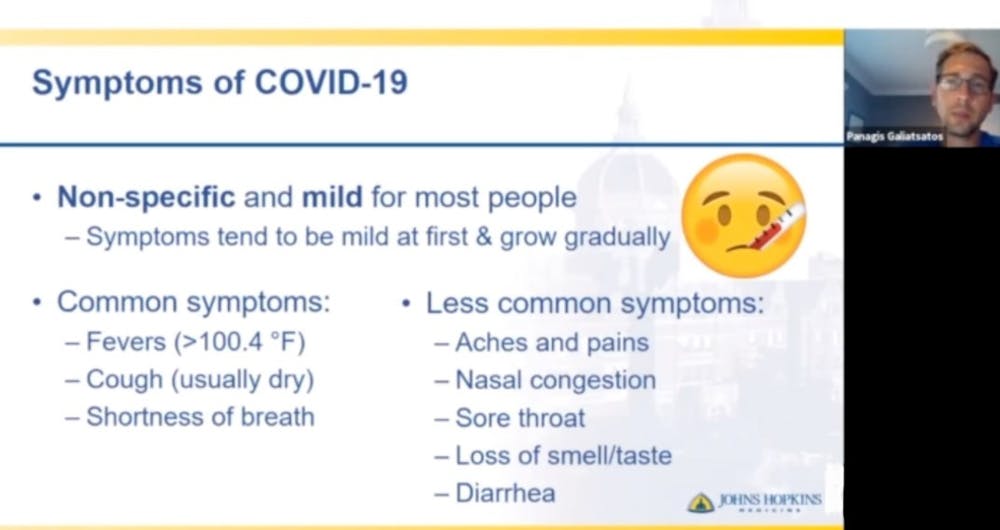Through the Health Education and Training (HEAT) Corps, Hopkins students and medical professionals are helping to educate K-12 students around the world about COVID-19.
In an interview with The News-Letter, sophomore Samantha Lee explained that the overall aim of the program is to educate students about steps they can take in their communities to slow the transmission of the virus. Lee is one of 55 undergraduate volunteer instructors for the program.
“We believe students in K-12 grades have the opportunity to make a positive impact in their communities,” she said. “As they share the information, they learn and lead by example among their friends and family to help battle COVID-19.”
Each class session will cover a different aspect of COVID-19; this could include biology of the virus, mathematical models of transmission, benefits of face masks and proper hand hygiene during the pandemic. Two volunteer instructors and a licensed medical professional from Hopkins lead the sessions.
Typically one of the instructors presents the material on the slides while the other answers questions in the chat window. The medical professional answers any questions that are beyond the scope of the course and offers first-hand experience on specific topics. Sessions typically end with a Q&A with all three members.
The virtual program was developed by Dr. Panagis Galiatsatos, a pulmonary and critical care physician at Hopkins.
Galiatsatos had previously helped to teach students in the Baltimore area about the effects of air pollution on lung health. When the pandemic struck, teachers reached out to Galiatsatos for his help to educate students about COVID-19. That led to the development of the HEAT Corps and the creation of a curriculum to teach children about COVID-19.
The program was piloted in the summer by Galiatsatos and colleagues. For the fall term, the HEAT Corps has been expanded to reach students in 24 states and five countries, and new schools continue to be added each week.
In addition to the 55 undergraduates, volunteers also include many others from the greater Hopkins community, including the School of Public Health, the School of Nursing and the School of Medicine.
Lee learned about the program this September through her involvement in Medical Tutorials and has recently been trained to begin instructing courses.
“HEAT Corps stood out to me since it combined my love for working with children while also allowing me the opportunity to help make a difference during this pandemic,” she said.
While she noted that physically emulating the classroom experience has been challenging, interacting virtually with the students is one of Lee’s favorite parts of the program. Activities include modeling the proper way to wash hands, showing off face-masks and taking “wiggle breaks” with some of the younger students.
The training process for volunteer teachers consists of Zoom sessions led by Galiatsatos to discuss the curriculum. The volunteers also review specific skills that are needed in community engagement, such as public speaking and advocacy.
The instructors also learn how to better answer students’ questions and engage with the students when teaching.
“We teach [instructors] in the training sessions how to respond to questions rooted in science, questions that may be a little bit more political and questions rooted a little bit more in conspiracy,” Galiatsatos said in an interview with The News-Letter.
Since disinformation about the virus is prevalent, the instructors are prepared to answer questions which may seem outlandish. Galiatsatos ensures that the HEAT Corps instructors are not dismissive of students’ questions.
According to Galiatsatos, the program teaches “at the pace of the community. One can request the HEAT Corps instruction for the school’s mandatory curriculum, as part of extracurricular clubs or even for home-schooled students.
Although the program is completely virtual, the HEAT Corps has taught in schools that are open for in-person learning or hybrid learning. All learning sessions are conducted free of charge.
Both Galiatsatos and Lee expressed amazement at the students’ engagement with the presentation and their enthusiasm to take action, whether it be by wearing proper masks or frequently washing their hands.
Galiatsatos emphasized that each one of us has the power to stop the spread of the virus.
“Front-line people are literally anyone with the potential to stop the spread of the virus. It means a lot to us to work with the undergrads and to work with the communities to tell them that,” he said. “The last line of defense is really doctors and nurses.”





